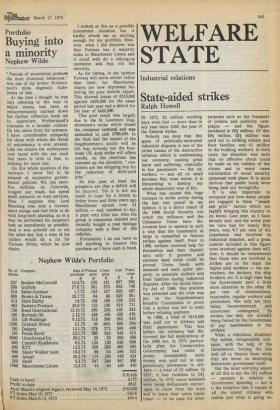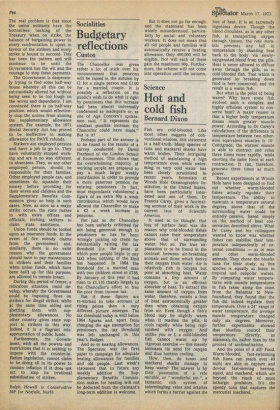WELFARE STATE
Industrial relations
State-aided strikes
Ralph Howell
IN 1972, 23 million working days were lost — more than in any year since 1926, the year of the General Strike.
Nobody can deny that this spate of politically-motivated industrial disputes is one of the prime causes of the destructive inflation which is undermining our economy, causing great harm and suffering, especially to the pensioners — the exworkers — and all on small incomes. But, even worse, it is threatening to destroy our whole democratic way of life.
What has caused this huge increase in strike action during the last. two years? In my opinion it is a direct result of the 1966 Social Security Act which the militants and the Claimants Union have discovered how to operate in such a way that the community at large is compelled to finance strikes against itself. Prior to 1966, strikers received help for themselves and their dependants only if genuine and extreme need could could be proved. Union funds were amassed and used, quite properly, to maintain strikers and their families during industrial disputes. After the Social Security Act of 1966, this position was reversed and the talus was put on the Supplementary Benefits Commission to prove that a striker was not in need, before refusing payment.
In 1968, a total of £415,000 was paid out to strikers and their dependants. This was before the militants had discovered the full implications of the 1966 Act. In 1970, particularly after the Conservative Government had come to power, considerably more money was paid out in supplementary allowances to strikers — a total of £2 million. In 1971, it had rocketed to £4 million. In 1972, union members were being deliberately encouraged to claim from the state and to leave their union funds intact — to be used for other
purposes such as the transport of pickets and publicity campaigns — and the figure escalated to £94 million. Of this £94 million, £54 million was paid out to striking miners and their families, and £1 mililon to the building workers. In both cases the situation was such that no effective check could be made on the validity of the claims and in many cases intimidation of social security personnel took place. It is quite obvious that public funds were being paid out wi ongfully.
It is also important to recognise just how many people are engaged in these "smash and grab" tactics which are rapidly bringing this country to its knees. Last year, as I have already said, was the worst year we have had for nearly fifty years, only 6.7 per cent of the population was involved in industrial disputes, and a great number included in this figure were involved against their will. Also, it should be remembered that those who are involved in strikes are in the main the higher paid workers — the carworkers, the dockers, the ship builders, etc. It is high time that the Government paid a little more attention to the other 93 per cent of conscientious, reascnable, regular workers and pensioners. Not only are they being inconvenienced, and sometimes endangered, by strikes, but they are actually being forced by the Government to pay maintenance to the strikers.
What a ridiculous situation! The selfish, irresponsible militants, with the help of the Government, forcing the less well off to finance them while they are intent on destroying democratic government itself.
But the most worrying aspect of all this is not the £9i million — peanuts in relation to Government spending — nor is it the irritation that it causes to all the sound citizens who realise just what is going on. The real problem is that since the union militants have the bottomless backing of the Treasury when on strike, the balance of bargaining power in every confrontation is upset in favour of the strikers and every strike is bound to succeed. This has been the pattern and will continue to be until the Gcvet nment has the wit and the courage to stop these payments.
The Government is desperately trying to find some half-way house whereby all this can be suit stantially altered but without being seen to be too tough on the wives and dependants. I am convinced there is no half-way position which would effectively stop the unions from abusing the supplementary allowance system. For example, the 1971 Social Security Act has proved to be ineffective in making allowance for PAYE refunds.
Strikers are employed persons and have a job to go to. They have voluntarily stopped working and are in no way different to absentees. They, as any other employed person, should be responsible for their families. Other employed people can, and sometimes do, squander their money before providing for their wives and children and the Supplementary Benefits Commission gives no help in such cases. Now, as soon as a major strike occurs, the state rushes in with extra offices and officials, inviting strikers to claim state assistance.
Union funds should be looked upon as insurance funds. In the event of fire nobody claims from the government and, similarly, there is no valid reason why the government should have to pay maintenance to strikers and their families when union funds, which have been built up for this purpose, are allowed to remain intact.
During this period of freeze, a ridiculous situation could develop, whereby the Government could be imposing fines on strikers for illegal strikes, while at the same time aiding and abetting them with supplementary allowances. No other country gives state support to strikers in this way. Indeed, it is a flagrant misappropriation of public funds.
Furthermore, the Government, with all the powers and restrictions that it is seeking to impose with the counter-inflation legislation, cannot claim to be doing all in its power to contain inflation if it does not act to stop its irrational subsidisation of strikes.
Ralph Howell is Conservative MP for Norfolk, North



































 Previous page
Previous page